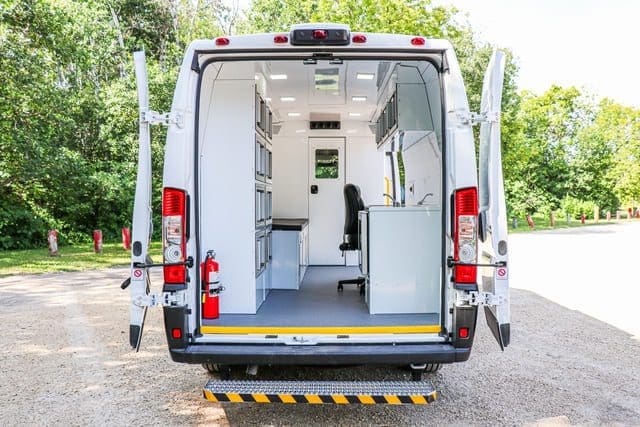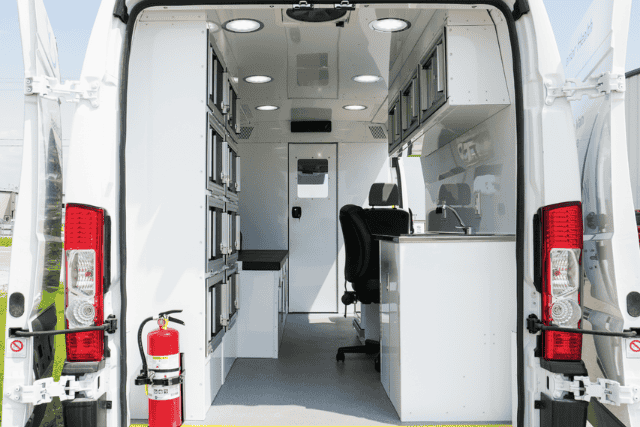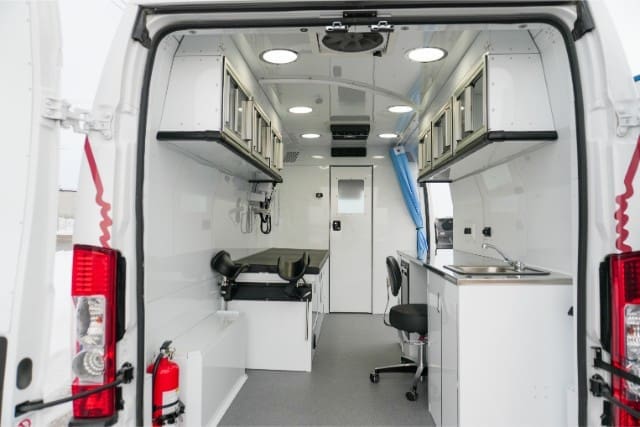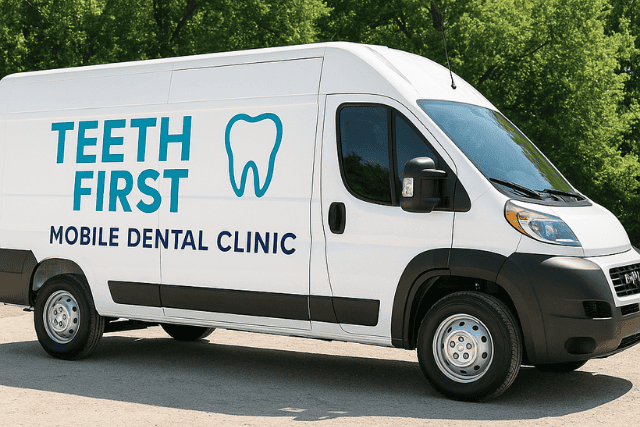Is your organization thinking about launching a mobile clinic program but you’re finding yourselves at a crossroads, unsure of which option to choose between mobile medical vans vs. RV clinics?
You’re not alone. Deciding between these two options is challenging, and the wrong decision can leave you with a mobile medical unit that prevents you from serving the communities you intend to help. It can also put budget constraints on your organization and have you spending more than you need to.
At AVAN Mobility, we understand how difficult it is to choose between mobile medical vans and RV clinics. We’ve been manufacturing mobile medical vans for over 10 years and have helped dozens of organizations find the right solution that helps reduce barriers to healthcare.
In this article, we want to make the decision-making process simpler for you by outlining the pros and cons of each option. After reading, you’ll have a clearer picture of which solution aligns best with your organization’s goals and objectives. Let’s dive in.
What is a mobile medical van?
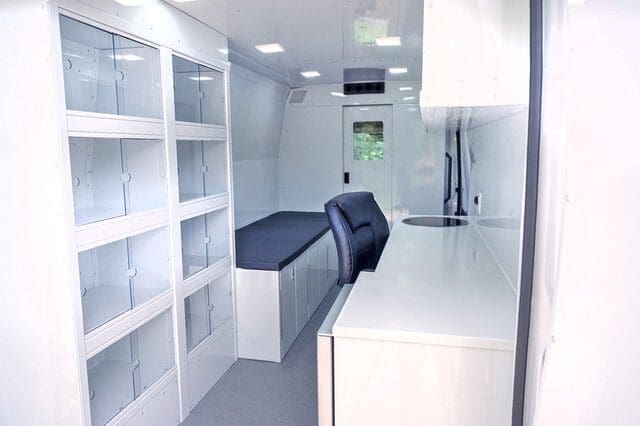
When it comes to providing healthcare, accessibility is key. But what if you can’t easily reach a doctor’s office or hospital? That’s where mobile medical vans come to the rescue. These remarkable vehicles are like basic healthcare facilities on wheels.
Picture a van equipped with medical tools and staffed by doctors and nurses. It’s like a doctor’s office, but it comes directly to the people your organization serves. These vans aim to make healthcare accessible to everyone, no matter where they live.
How do they work?
Mobile medical vans are designed to be versatile and responsive to community needs. They provide a wide range of healthcare services, such as:
Check-ups: Just like a regular doctor’s office, your patients can get their health checked in a mobile medical van. You can assess their overall health, measure vital signs like blood pressure, and even conduct screenings for various health conditions.
Health education: These vans are not just about treating illnesses; they’re also about preventing them. You can use these vans to provide your patients with valuable health education and information on how to maintain a healthy lifestyle.
Specialized care: Some mobile medical vans are equipped to provide specialized care. Whether it’s dental services, vision tests, or women’s health, these vans can address specific healthcare needs.
Let’s look at an example:
Meet Sarah, who lives in a remote Native Reservation in South Dakota. Healthcare was a struggle here, with distant hospitals and no transportation. Then, a mobile medical van arrived, changing everything.
Sarah had a persistent cough, and the van was a lifeline. Inside, friendly staff gave her a check-up and even an X-ray, diagnosing a lung infection. The best part? She got her medicine on the spot, and no travel or time off work was needed.
Word spread and the van became a community healthcare hub. It offered healthcare and health education. For Sarah and her neighbors, it meant easy access to vital services without long journeys.
This van was more than healthcare; it was hope. It showed that even in remote areas, people can get the care they deserve. Sarah’s story is just one of many where mobile medical vans make a real difference in people’s lives, no matter where they live.
Why are they important?
Now, you might wonder, why go for a mobile medical van instead of visiting a regular healthcare facility? Here are a few reasons:
Accessibility: Mobile medical vans bridge the gap between healthcare and underserved communities or located far from traditional healthcare centers. They reach rural areas, urban neighborhoods, and even events or disaster-stricken areas, ensuring that healthcare is within reach for all.
Convenience: Imagine not having to travel long distances or wait for hours in a crowded waiting room. Mobile medical vans offer the convenience of receiving healthcare services right in your neighborhood, reducing the time and effort required to access care.
Preventive care: These vans don’t just treat illnesses; they also focus on preventive care. The vans do this by offering check-ups, and health education. This can help communities stay healthy and catch potential health issues early.
How much does a mobile medical van cost?
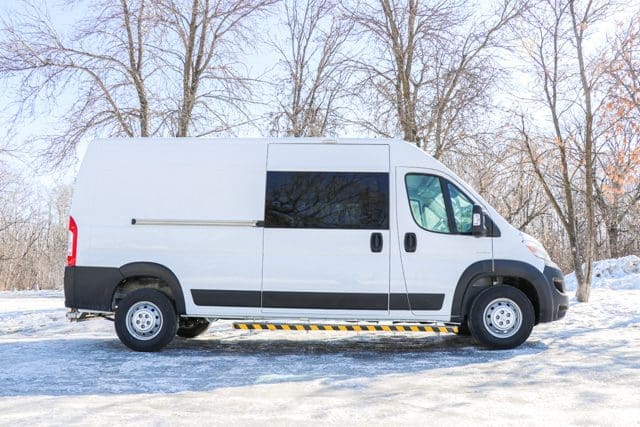
The price of a mobile medical van varies between $125,000 to $225,000. How much you pay depends on how customized your organization needs it to be.
If you want a basic mobile medical van without much customization, your costs will be on the lower end of the price range. These vans can do important healthcare work but don’t have all the bells and whistles that some of the more advanced setups have.
If you need a fully-customized van with medical gear, you can expect to be paying at the higher end of the cost spectrum.
So, when you’re thinking about getting a mobile medical van for your organization, think about what you really need and how much you can spend. Customizing the van can increase the price, but it’s important to get what fits your healthcare plans. Keep in mind that these costs are just estimates and are subject to change without notice.
What is an RV clinic?
RV clinics, short for recreational vehicle clinics, are essentially medical facilities on wheels, housed within RVs. These vehicles are similar to mobile medical vans in the sense that they offer healthcare services outside of traditional medical settings.
How do they work?
RV clinics are a unique way to provide healthcare services. Let’s take a closer look at how they work.
Mobile healthcare hub: RV clinics are essentially healthcare hubs on wheels. These specialized vehicles are equipped with all the essential medical equipment and supplies needed to provide a wide range of healthcare services. From examination rooms to diagnostic tools, they have it all packed inside the RV.
Community outreach: One primary way RV clinics work is by reaching out to communities that have limited access to traditional healthcare facilities. They travel to rural areas, underserved neighborhoods, and events where people gather. This outreach ensures that healthcare services are brought directly to those who need them most.
Customized healthcare: RV clinics can be customized to meet the specific healthcare needs of the communities they serve. Inside the RV, the layout and equipment can be tailored to offer various services. This means they can provide everything from general check-ups to more specialized care like dental treatments or screenings for chronic illnesses.
Why are they important?
RV clinics are important for several reasons:
Less hassle, more help: Imagine your patients not having to travel far or wait forever in a crowded clinic. RV clinics make it easy. Your organization can set up an RV clinic in your target community, saving your patients time and effort. That means they can see a doctor or nurse without a big fuss.
Staying healthy: These clinics aren’t just about fixing existing problems; they also help your patients stay healthy. They offer check-ups, teach people about staying well, and even spot health issues early. This means your team can catch problems in your patients before they turn into bigger ones.
Community connection: RV clinics become part of the neighborhood. They’re friendly faces offering care and advice. When they visit regularly, people start trusting them.
How much does an RV clinic cost?
The cost of a customized RV clinic typically starts at around $250,000 and ranges up to $1,000,000 or more. RV clinics range in costs in the same way that mobile medical vans do. A basic RV clinic will be more affordable than a fully customized RV with advanced medical technology and equipment.
Pros and cons of mobile medical vans vs. RV clinics
There are a variety of pros and cons of mobile medical vans vs. RV clinics. Let’s dive a little deeper into that.
Pros of mobile medical vans
Versatile size: Mobile medical vans, like ours at AVAN Mobility that are built on the RAM Promaster 2500 with a smaller wheelbase of 159 inches, can easily navigate tight spaces and crowded neighborhoods. This makes them great for reaching patients in urban areas.
Customization: Mobile medical vans can be customized to meet specific healthcare needs.
Cost Savings: Mobile medical vans usually cost less to run than RV clinics. This includes spending less on things like fuel and maintenance when you compare them to bigger RV clinics.
Mobility: They are, well, mobile! They can travel to different locations, bringing healthcare directly to communities, events, or disaster-stricken areas. Mobile medical vans are small and compact. Because of that, they can be rapidly deployed in emergencies or disaster response situations.
Personalized attention: Mobile medical vans often offer patients a more personal and one-on-one experience. This can help patients feel more trusted and at ease.
Cons of mobile medical vans
Limited space: Due to their smaller size, the interior space of mobile medical vans is a little more limited. This can play a role in the type of services your organization offers. While medical vans are smaller than RVs, some patients prefer the smaller environment as it’s easier for healthcare teams to provide individualized care and attention.
Patient capacity: Mobile medical vans can’t hold as many patients as bigger RV clinics. This can potentially lead to longer waits for people who need medical help.
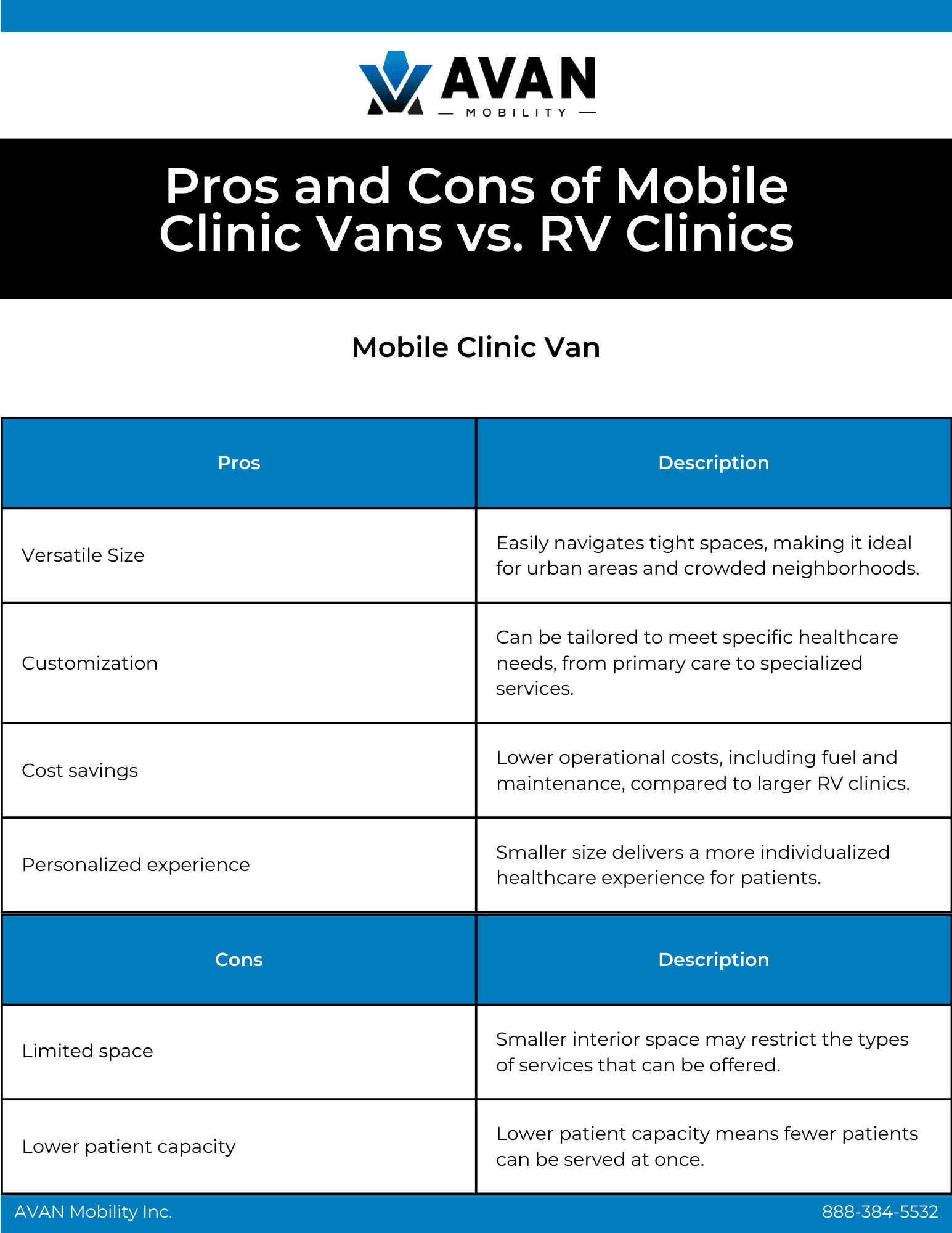
Pros of RV clinics
Spacious interiors: RV clinics typically offer more interior space, allowing for a broader range of medical services.
Amenities: They often come equipped with amenities like restrooms and waiting areas, enhancing the overall patient experience.
Longer trips: RV clinics can sustain longer trips without needing frequent restocking, making them suitable for rural areas with fewer resources.
Cons of RV clinics
Size limitations: RVs are larger and less maneuverable, making it challenging to reach patients in tight urban areas or narrow roads.
Accessibility challenges: RVs might not be as wheelchair-friendly as mobile medical vans, which could limit care for individuals with mobility issues.
Higher costs: The purchase, maintenance, and fuel costs for RV clinics are higher compared to mobile medical vans.
Maintenance: Because of their larger size and extra amenities, RV clinics require more maintenance and repairs.
Space requirements: Finding a suitable location to set up an RV can be difficult, especially in urban areas or facilities with limited parking space.
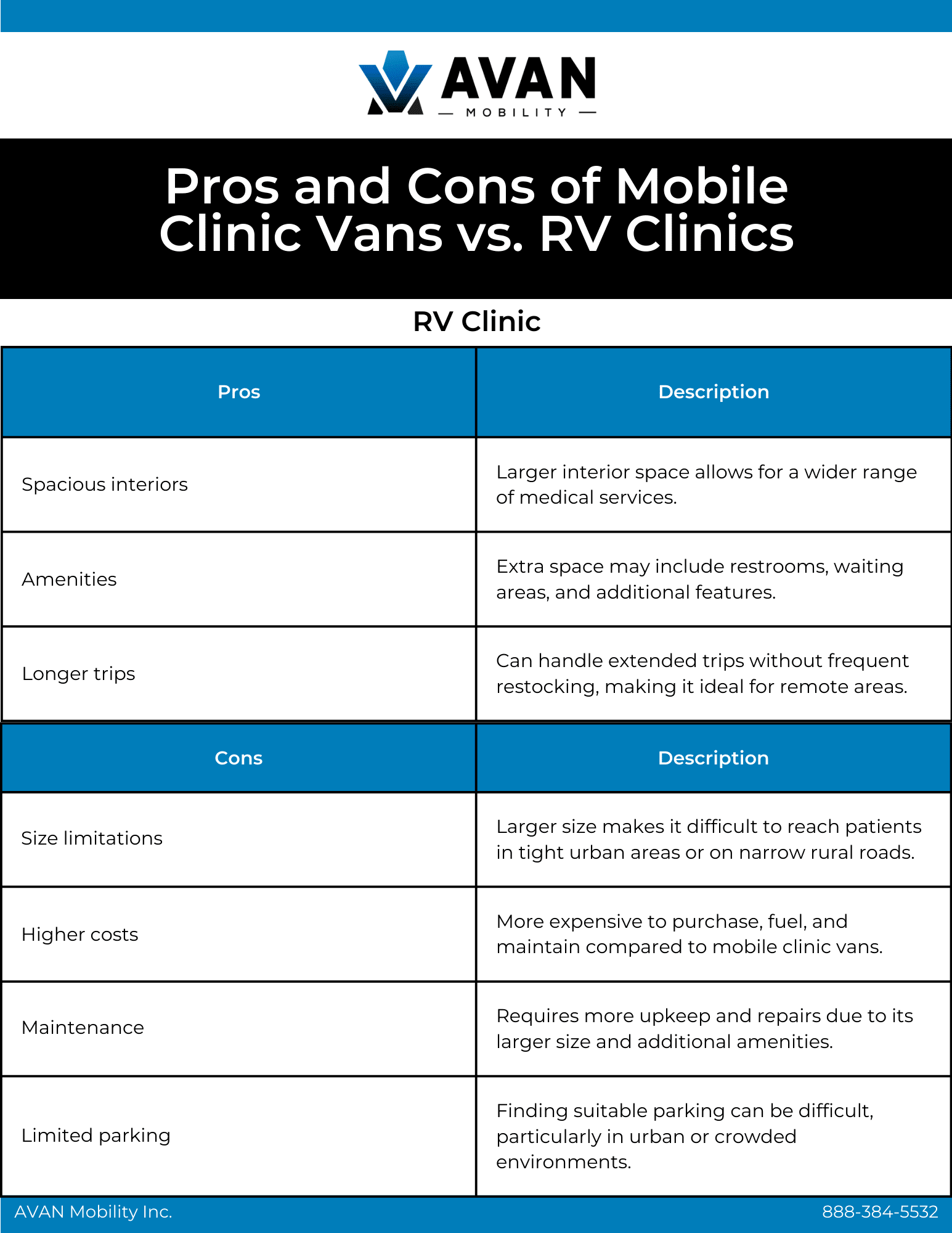
The bottom line
Choose mobile medical clinics when you need to reach remote or underserved communities easily and more efficiently. They’re purpose-built for these areas, ensuring better access to healthcare in a more personalized setting.
Opt for RV clinics if you require more space and flexibility for larger and more extensive healthcare programs, such as a dental or mammography clinic. RVs provide ample room to accommodate a wide range of medical services and equipment.
Trying to figure out what the easier mobile healthcare setup is between mobile medical RVs vs. mobile medical vans? Check out our article on that to learn more.
Need help deciding between mobile medical vans vs. RV clinics?

You came to this article trying to learn more about the pros and cons of mobile medical vans vs. RV clinics. Our goal was to help you decide which one will work better for your organization’s healthcare plans.
We know it’s tough to decide between these two options because picking the wrong one could make it hard to provide healthcare where it’s needed the most. It can also end up costing more than your organization wants to spend.
Don’t forget that our team at AVAN Mobility is here to help you make the right choice. We’ve been helping organizations like yours reduce barriers to healthcare for years. Talk to an expert today to learn more about our mobile medical vans.
You should also read our article and take a look at some of the different types of mobile medical units we offer. After that, read our article on securing grants for mobile health clinics in the U.S. to make the financial burden easier to bear.


